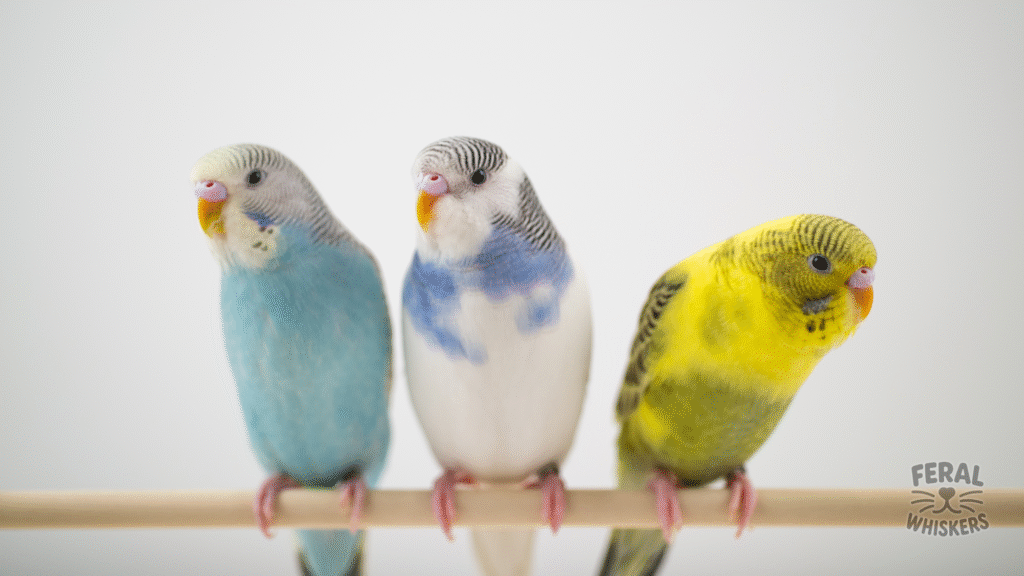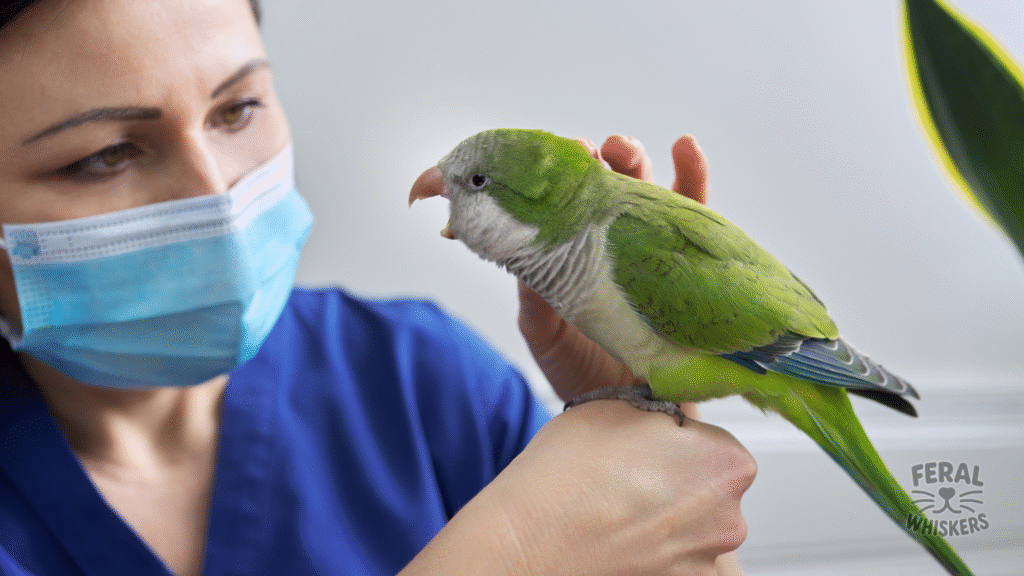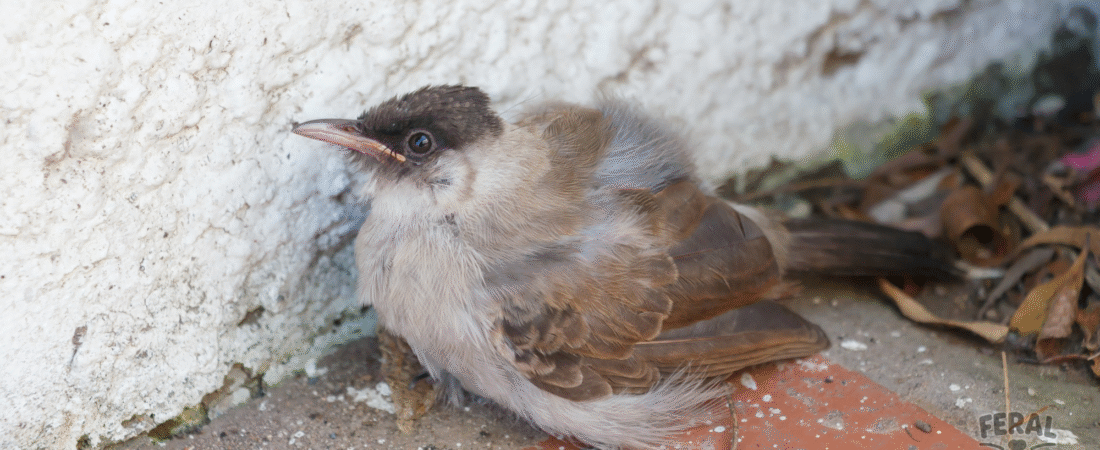Introduction: Wellness Starts at Home
Birds are delicate, intelligent, and highly sensitive creatures. In the wild, their instincts drive them toward fresh air, diverse foods, and safe habitats. In our homes, we as caretakers need to recreate those conditions as much as possible.
Holistic bird care means focusing on the whole bird: physical, mental, and environmental health. Prevention is better than cure — and the right diet, environment, and daily care can prevent many common illnesses in pet birds.

1. Why Prevention is Critical in Bird Care
- Birds hide illness well (a survival instinct to avoid looking weak in a flock).
- By the time symptoms are visible, disease may already be advanced.
- Regular holistic care prevents stress, boosts immunity, and supports overall wellbeing.
Common preventable conditions:
- Obesity from seed‑only diets.
- Respiratory illness from poor air quality.
- Liver and kidney issues from poor nutrition.
- Feather plucking from stress and boredom.
2. Nutrition: The Foundation of Health
Balanced Diet Checklist
✔ Pellets (60–70%) – formulated for species (e.g., cockatiel, budgie, parrot).
✔ Fresh Vegetables (20–25%) – dark leafy greens (kale, dandelion, spinach), carrots, broccoli, peppers, squash.
✔ Fruits (5–10%) – apple (seedless), berries, melon, mango, papaya.
✔ Occasional Protein – cooked eggs, legumes, sprouted seeds, or small bits of lean chicken.
✔ Seeds as Treats – use sparingly; most parrots love them but they’re high in fat.
Holistic Nutrition Boosters
- Sprouted Seeds/Grains: Easier to digest, more nutrients.
- Herbal Greens: Chickweed, dandelion greens (safe, pesticide‑free).
- Fresh Herbs: Parsley, basil, mint — natural enrichment and nutrients.
Foods to Always Avoid
- Avocado
- Chocolate
- Caffeine
- Onion & garlic
- Salt & sugar
- Alcohol
- Apple seeds/cherry pits
3. A Clean, Safe Environment
Air Quality
Birds have sensitive respiratory systems. Protect them by:
- Avoiding non‑stick pans/Teflon (PTFE/PFOA fumes = fatal).
- No cigarette smoke, scented candles, or strong aerosols near them.
- Use air purifiers in rooms with birds.
Cleanliness
- Daily: Remove droppings, change water, wash food bowls.
- Weekly: Wash perches, toys, and cage surfaces.
- Monthly: Deep clean cage fully.
Natural Light & Sleep
- Birds need 10–12 hrs of rest in a quiet, dark area.
- Provide natural daylight cycles OR full‑spectrum avian lighting.
4. Mental & Emotional Health (Stress Prevention)
Holistic care isn’t just food — it’s also about happiness.
Enrichment & Play
- Rotate toys (foraging, shredding, bells, ropes).
- Encourage problem‑solving (hiding treats in safe containers).
- Provide safe flying or exploring time outside the cage daily.
Social Interaction
- Talk to your bird often.
- Hand‑feed treats.
- Respect alone time if bird shows body language for space.
Stress Reduction
- Keep routine consistent.
- Avoid loud, chaotic environments.
- Provide hiding or cozy spots for downtime.
5. Holistic Natural Aids (With Vet Guidance!)
Some safe, commonly used holistic supports for birds:
- Chamomile Tea (diluted): Calming effect.
- Aloe Vera Spray (diluted): Helps soothe dry skin/feathers (external only).
- Milk Thistle Seed: Supports liver health.
- Echinacea: Can boost immune system short‑term.
⚠ Important: Always consult an avian veterinarian before adding herbs or supplements. Birds’ metabolisms are unique, and overdosing can be harmful.
6. Early Warning Signs of Illness
Call an avian vet immediately if you see:
- Fluffed feathers for extended periods.
- Lethargy, sitting at bottom of cage.
- Changes in droppings (color, consistency, blood).
- Labored breathing, tail bobbing.
- Loss of appetite or excessive thirst.
- Discharge from eyes or nostrils.
- Feather plucking or bald patches.
7. When to Visit the Vet

- Yearly check‑ups are recommended for all pet birds.
- Emergency visits if sudden behavioral or physical changes appear.
- Bloodwork & fecal tests help detect hidden issues early.
8. Fun Facts About Bird Wellness
- Parrots in the wild spend up to 70% of their day foraging — which is why enrichment at home is so key.
- Birds preen feathers with oils produced by a special gland near their tail — this keeps them waterproof and clean.
- A stressed parrot’s immune system weakens, making them more likely to get sick.
- Sunlight not only boosts mood but also helps process Vitamin D for strong bones.
9. FAQs
Q1: What’s the #1 cause of pet bird illness?
Poor diet (seed‑only diets cause obesity, liver disease, and vitamin deficiencies).
Q2: How do I keep my bird’s immune system strong naturally?
Balanced diet, fresh air, clean environment, enrichment, and regular vet care.
Q3: Is it safe to give my parrot herbal teas?
Some diluted teas (like chamomile) are safe, but always ask an avian vet before using herbal remedies.
Q4: My bird plucks its feathers. Is it sick?
Feather plucking can be stress, boredom, hormones, or illness. Always rule out medical problems first.
Q5: Should my bird get sunshine?
Yes! Natural unfiltered sunlight (through open window or outdoor aviary) is ideal, but supervised. If not possible, use bird‑safe UV lighting indoors.
Final Takeaway
Holistic health for pet birds is about creating balance: good food, clean air, fresh water, natural light, play, and emotional stability. Prevention is gentler, safer, and easier than treatment.
By practicing daily wellness — from proper diet to stress reduction — you’re giving your bird the gift of a long, happy, and healthy life.

